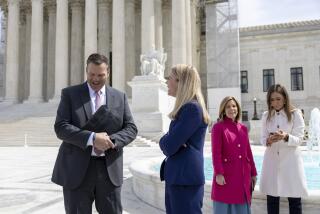Judges Override Limits on Individual Liberties
- Share via
WASHINGTON — If the Supreme Court were to reverse its own 1973 ruling and say abortion is not a constitutional right, the sea change in American law would cause barely a ripple for women in California and Florida.
Legislators in most states would be free to impose new restrictions or even outlaw abortion. But like-minded lawmakers in Sacramento and Tallahassee would be stymied--by rulings of their state’s highest court.
Today, a growing number of state courts are mining their home-grown constitutions--interpreting words most often virtually identical to those in the federal Constitution--to discover expanded individual rights.
Such rulings are insulated from any second-guessing by the U.S. Supreme Court. The final arbiter of any provision within a state constitution is that state’s highest court.
The California Supreme Court and the Florida Supreme Court have ruled that the right of privacy provided by their state’s constitution--independent of any right gleaned from the federal Constitution--includes a woman’s choice to end her pregnancy.
“Those states are safe states in that sense,” said Marcy Wilder, a lawyer with the National Abortion Rights Action League. “There would be no immediate impact.”
Similar state constitution decisions have been issued by state appellate courts in Michigan and New York, Wilder said, but those states’ highest courts have not yet ruled on the issue.
“These kinds of state court decisions are growing like dandelions in a spring lawn,” said John Hingson III, an Oregon City, Ore., criminal-defense lawyer and outspoken champion of what he believes is a largely untapped wellspring of individual rights.
“There is no obligation for state courts to blindly follow the decisions of an archconservative U.S. Supreme Court as it whittles away at the Bill of Rights,” Hingson said. “State constitutions provide a refuge for the liberties secured 200 years ago on the federal level.”
The trend has its critics.
“I’m not a fan of activist judicial review, whether by state or federal courts,” said Earl Maltz, a law professor at Rutgers University. “Most of those who applaud this trend have a not-very-well-disguised agenda: liberalism. Confronted with dim prospects at the U.S. Supreme Court, they are saying, ‘Let’s look for some other court to do other liberal stuff.”’
Other signals from the states:
* After the nation’s highest court indicated that Amish residents of Minnesota could not depend on the federal Constitution to fend off a law requiring brightly colored warning symbols on their horse-drawn buggies, the Minnesota Supreme Court said its state constitution offered greater protection for religious views.
The Amish were exempt from the law, the state court said.
* The U.S. Supreme Court long ago upheld the constitutionality of government bans on funding for women on welfare who seek abortions. But state courts in California, Connecticut and Massachusetts have ruled that such restrictions in their state programs providing medical aid to the poor violate their state constitutions. Women on welfare generally cannot be denied financial help for abortions in those states.
* The federal Constitution offers no protection for “obscene” speech and expression. But in Oregon, due to a 1987 decision by its Supreme Court, full legal protection is offered for obscenity.
Retired Supreme Court Justice William J. Brennan was the first champion of this brand of states’ rights.
Brennan’s 1977 article in the Harvard Law Review praising the use of state constitutions as a resource for individual rights won national attention. But such use remained rare for the next decade, pioneered by the highest courts of New Jersey, California and Oregon.
The highest courts in Hawaii, Alaska, Washington, South Dakota and Pennsylvania have joined the trend, albeit in limited fashion.
The federal Constitution sets a minimum standard, and no state government can offer less protection for individual rights than what the Supreme Court says the Constitution requires.
More to Read
Get the L.A. Times Politics newsletter
Deeply reported insights into legislation, politics and policy from Sacramento, Washington and beyond. In your inbox twice per week.
You may occasionally receive promotional content from the Los Angeles Times.










